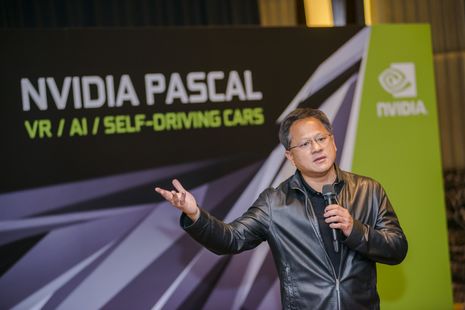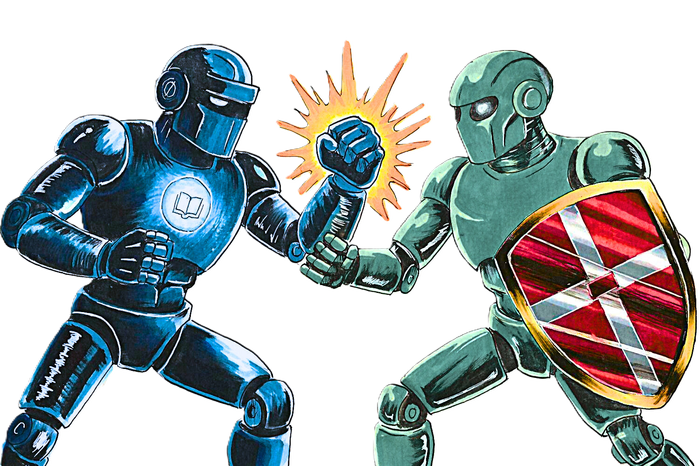Cambridge can’t beat AI
Daisy Hewitt reflects on her experience listening to Jensen Huang speak at the Cambridge Union and argues that AI may not be a positive innovation for Cambridge students

On a grey November afternoon, over four hundred students stood shivering outside the Cambridge Union, waiting to hear NVIDIA CEO Jensen Huang receive the Stephen Hawking Fellowship. Some had queued for hours. By the time he entered the chamber, there was an electric sense of anticipation. Not because we were looking for internship opportunities, but because here was a man who had shaped the world we are now trying to find our place in.
Huang spoke with characteristic optimism, encouraging us to approach difficult goals as though they were achievable, collaborate rather than compete, and see AI as a tool for transformation (not as a threat). He was persuasive, charismatic, grounded and unexpectedly philosophical. But his words were addressed to a room built on competition. At Cambridge, rivalry is the air we breathe. We queue for talks, fight for internships, compare grades, and measure our worth in productivity. Collaboration sounds lovely in theory; at least until the rankings are released.
“People are creating gods of their own – vast, synthetic consciousnesses that learn, reason and evolve”
When asked whether the Cambridge culture of competition is really conducive to innovation, Huang hesitated before suggesting there might be better ways to learn. It was a short answer, but it felt significant. Because beneath the endless race of essays, internships, supervisions, applications, there’s a quieter exhaustion. The sense that we are constantly proving our value, without ever stopping to ask what that value actually is.
AI sharpens that question to a blade. For the first time, students are facing a technology that can think, or at least imitate thinking, faster than we can. Every time we sit down to write an essay, there’s a moment of temptation: could ChatGPT do it better? Could it read faster, argue cleaner, and save us the hours we’ll spend staring at JSTOR tabs at 2 am?
It’s not that we will outsource our essays. It’s that we could. And that possibility alone changes the moral texture of studying. If intelligence can now be replicated, what happens to the value of our own? In trying to create minds that think like us, we may be inventing something that no longer needs us at all.
Humanity once imagined gods who created people. Now, people are creating gods of their own – vast, synthetic consciousnesses that learn, reason and evolve. Where does that leave us? What is left to strive for, to prove, to become, when the thing we once defined ourselves by – thought itself – can be automated? AI forces us to confront not only our purpose, but our identity. If machines can think, what exactly makes us human?
Huang’s optimism about AI’s impact on the job market contrasted sharply with the mood outside the Union, where students joked about who would be replaced first. Many of us already live in a kind of economic premonition: scanning LinkedIn like a leaderboard, watching peers accumulate internships like Pokémon cards, all while pretending to be above it. There’s an unspoken panic in the air – the sense that everyone else has a five-year plan, and you’re still figuring out how to make it through week 5 intact.
“At Cambridge, rivalry is the air we breathe”
In that context, AI becomes both a threat and a mirror. It exposes how much of our self-worth depends on doing things faster, earlier, and better. The culture of efficiency – one Huang helped build – has finally come for us. If a machine can optimise, where does that leave the messy, human process of learning? Perhaps, optimism means not competing with AI but rediscovering the parts of ourselves it can’t imitate: curiosity, empathy, imagination – and maybe the ability to procrastinate spectacularly.
But that’s harder than it sounds at a university that often confuses intellect with output. We are conditioned to chase rankings, not reflection; to treat reading lists as obstacles rather than invitations. AI may change education, but it also reveals what was fragile about it all along. When knowledge becomes instantly accessible, the value of thinking shifts from what you know to why you care.
Maybe that’s the real test of our generation: not how well we can adapt to machines, but how we redefine meaning in their presence. Cambridge students are used to being measured – by grades, deadlines, job offers. Now we’re facing a metric we can’t possibly win. And perhaps that’s freeing. If intelligence is no longer uniquely human, maybe humanity itself becomes more precious.
The queue outside the Union wasn’t just about seeing a tech celebrity. It was about standing at the edge of something: the end of one era of learning and the uncertain start of another. AI will, as Huang said, transform every sector, every part of life. But the more it transforms, the more it forces us to decide what kind of people we want to be within it.
In the meantime, Cambridge will go on as it always has with essay crises, job applications, quiet comparisons. But maybe the next time we catch ourselves scrolling through LinkedIn in despair or calculating how far behind we are, we might remember that not every race is worth running. The future is arriving fast, but for once, we don’t have to compete with it. Until then, I’ll be queuing for lectures, writing essays, and pretending not to be terrified of my own laptop.
 News / Colleges charge different rents for the same Castle Street accommodation2 March 2026
News / Colleges charge different rents for the same Castle Street accommodation2 March 2026 News / News in Brief: waterworks, wine woes, and workplace wins 1 March 2026
News / News in Brief: waterworks, wine woes, and workplace wins 1 March 2026 News / Climate activists protest for ‘ethical careers policy’1 March 2026
News / Climate activists protest for ‘ethical careers policy’1 March 2026 News / Private school teacher who lied about Cambridge degree barred from teaching27 February 2026
News / Private school teacher who lied about Cambridge degree barred from teaching27 February 2026 News / Angela Merkel among Cambridge honorary degree nominees27 February 2026
News / Angela Merkel among Cambridge honorary degree nominees27 February 2026









